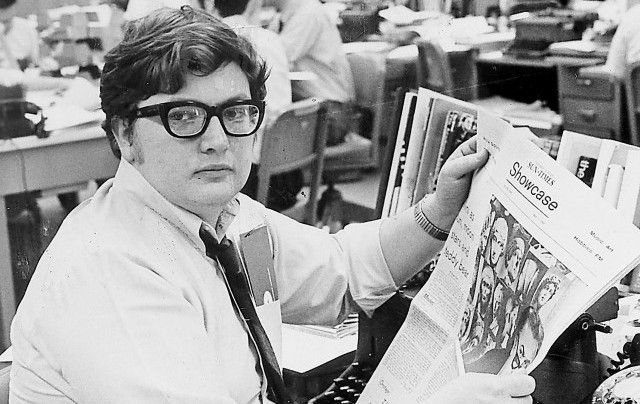Roger Ebert's Lasting "Leave of Presence"

I learned of Roger Ebert’s death not two days after he reported that he would be stepping down from reviewing 200+ films a year in favor of reviewing one or two a week. What he called a “leave of presence” now means more to me than simply an affirmation of his witty and clever phrasing. Roger Ebert will never write a review again, but his comment reminds us that the legacy of the man who dedicated 46 years to professionally writing about film will never go away. Just as his writing allowed his voice to live on after he lost it due to jawbone cancer in 2006, so too will it allow him to live on now. His “leave of presence” will be longer than anticipated, but the descriptor is apt nonetheless.
Stating that Ebert is the most important film critic ever may very well be hyperbole, but I’m confident that he will always be the most important film critic to me. Many people justifiably claim that there are more important film critics — those who developed their field in its early stages. While I’ve read and appreciated many of them, they were writers and critics first and foremost; Roger Ebert was a personality. This may seem unimportant in the grand scheme of things, but for those young filmgoers developing a taste in film, it’s integral. It made Roger more than someone I read and turned him into someone I grew up with. And while I may have taken part internally in larger intellectual debates with other film scholars, no one else ever made me love film in the same way. While I respected many critics for their intellectual depth and the nuance in their art, just as I did many filmmakers, I never adored any like I did Roger Ebert. I got to read him while he was writing, and to see him develop and change, at least for the last decade or so of his career. I can argue with other film critics, but Roger Ebert was the only one I could have a conversation with.
Roger Ebert is unique to me among film critics I respect in that I often completely disagreed with his opinions and, at least late in his life, I didn’t always consider him a great reviewer or someone whose analysis of film I would recommend to friends. That’s not a condemnation though, because the man was unique in always maintaining my interest even when I thought he missed the point, and I always wanted to know what he had to say. He wasn’t just a reviewer, he was an idol and a figure I looked up to. He was downright hilarious and always seemed genuine, never afraid to share opinions that contradicted the majority. He was eloquent but always maintained a conversational tone. Roger Ebert, more than anything, loved film, and he helped a generation or two love them almost as much as he did. He was almost grandfatherly in his demeanor, and in fact he received his longtime job writing reviews for the Chicago Sun-times not by applying but because his love of film permeated from his very being. As a general reporter for the Chicago Sun-Times who simply happened to love film at the same time, he was offered the job of film critic after the previous critic left the job. He didn’t even know the job was available beforehand.
Ebert brought film to the hearts and minds of millions on his syndicated TV show “At the Movies…” for years, along with his co-host Gene Siskel. After Siskel died due to complications from surgery on a brain tumor in 1999, Ebert continued the show with various co-hosts, before Richard Roeper was officially selected as his co-host. Eventually, Ebert left the program due to his inability to speak caused by his cancer and complications from surgery in 2006. Always gamely, he continued writing over 200 reviews a year, and in fact achieving a career peak with 300+ reviews just last year. He continued to make press appearances despite the physical complications he faced due to cancer, and he always maintained the same cheerful and personable demeanor throughout. Most notable during this period was when he regained the ability to speak in his own voice, albeit through artificial means, when a company was able to use the hundreds of hours of DVD commentaries he had recorded to reproduce an artificial version of his voice to speak for him when he typed into a computer. It replaced a British voice Ebert had affectionately dubbed “Lawrence.” When I wrote earlier that Ebert’s writing allowed his voice to continue after he lost it, I meant it in more ways than one.
My memories of Ebert are numerous, and I cherish them all. Experiences such as trying to go see a movie, discovering it was sold out and then walking to a nearby bookstore to read Ebert’s “The Great Movies” in the middle of the aisle for hours made me feel like I knew more about the man than simply his taste in film and writing sensibilities. He, more than any other critic, managed to introduce his own voice into a piece without sacrificing the intelligence of the work, and that above all made reading him feel like my own personal conversation with the man. The strongest memory I have is bonding with my freshman roommate the last night of finals period reading his funniest reviews. Both of us, unable to sleep and having a German final at 9 a.m., stayed up all night and ended up reading Ebert for several hours. His review of “Deuce Bigelow European Gigolo” in particular sticks in my mind as his finest moment. Responding to “actor” (and I use that term loosely) Rob Schneider’s own critique of another film critic, noting that he had not won a Pulitzer Prize and thus was not qualified to criticize his film, Ebert retorted “As chance would have it, I have won the Pulitzer Prize, and so I am qualified. Speaking in my official capacity as a Pulitzer Prize winner, Mr. Schneider, your movie sucks.”
When I read of Ebert’s “extended leave of presence,” my immediate reaction was “You’ve earned it, Roger — for all your hard work, your dedication, your enthusiasm and love, your down-to-earth earnestness and your passion.” And although that leave will be longer than I expected, the statement still stands: You have earned it, Roger.




Comments ()